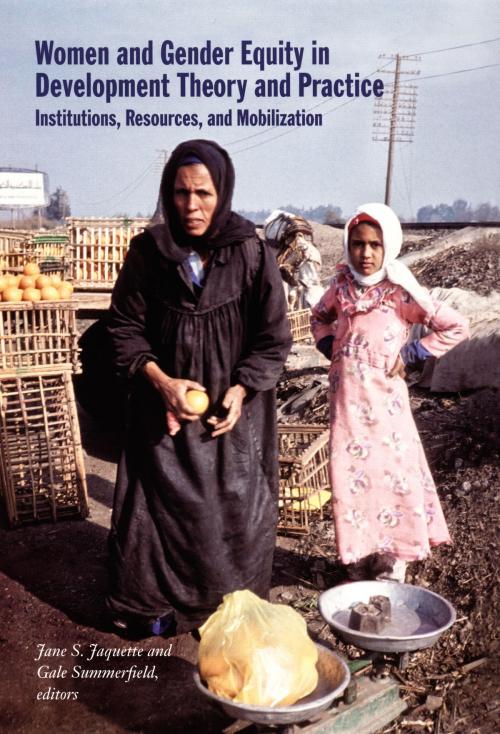Women and Gender Equity in Development Theory and Practice
Institutions, Resources, and Mobilization
Nonfiction, Social & Cultural Studies, Social Science, Gender Studies, Feminism & Feminist Theory| Author: | Louise Fortmann | ISBN: | 9780822387756 |
| Publisher: | Duke University Press | Publication: | March 27, 2006 |
| Imprint: | Duke University Press Books | Language: | English |
| Author: | Louise Fortmann |
| ISBN: | 9780822387756 |
| Publisher: | Duke University Press |
| Publication: | March 27, 2006 |
| Imprint: | Duke University Press Books |
| Language: | English |
Seeking to catalyze innovative thinking and practice within the field of women and gender in development, editors Jane S. Jaquette and Gale Summerfield have brought together scholars, policymakers, and development workers to reflect on where the field is today and where it is headed. The contributors draw from their experiences and research in Latin America, Asia, and Africa to illuminate the connections between women’s well-being and globalization, environmental conservation, land rights, access to information technology, employment, and poverty alleviation.
Highlighting key institutional issues, contributors analyze the two approaches that dominate the field: women in development (WID) and gender and development (GAD). They assess the results of gender mainstreaming, the difficulties that development agencies have translating gender rhetoric into equity in practice, and the conflicts between gender and the reassertion of indigenous cultural identities. Focusing on resource allocation, contributors explore the gendered effects of land privatization, the need to challenge cultural traditions that impede women’s ability to assert their legal rights, and women’s access to bureaucratic levers of power. Several essays consider women’s mobilizations, including a project to provide Internet access and communications strategies to African NGOs run by women. In the final essay, Irene Tinker, one of the field’s founders, reflects on the interactions between policy innovation and women’s organizing over the three decades since women became a focus of development work. Together the contributors bridge theory and practice to point toward productive new strategies for women and gender in development.
Contributors. Maruja Barrig, Sylvia Chant, Louise Fortmann, David Hirschmann, Jane S. Jaquette, Diana Lee-Smith, Audrey Lustgarten, Doe Mayer, Faranak Miraftab, Muadi Mukenge, Barbara Pillsbury, Amara Pongsapich, Elisabeth Prügl, Kirk R. Smith, Kathleen Staudt, Gale Summerfield, Irene Tinker, Catalina Hinchey Trujillo
Seeking to catalyze innovative thinking and practice within the field of women and gender in development, editors Jane S. Jaquette and Gale Summerfield have brought together scholars, policymakers, and development workers to reflect on where the field is today and where it is headed. The contributors draw from their experiences and research in Latin America, Asia, and Africa to illuminate the connections between women’s well-being and globalization, environmental conservation, land rights, access to information technology, employment, and poverty alleviation.
Highlighting key institutional issues, contributors analyze the two approaches that dominate the field: women in development (WID) and gender and development (GAD). They assess the results of gender mainstreaming, the difficulties that development agencies have translating gender rhetoric into equity in practice, and the conflicts between gender and the reassertion of indigenous cultural identities. Focusing on resource allocation, contributors explore the gendered effects of land privatization, the need to challenge cultural traditions that impede women’s ability to assert their legal rights, and women’s access to bureaucratic levers of power. Several essays consider women’s mobilizations, including a project to provide Internet access and communications strategies to African NGOs run by women. In the final essay, Irene Tinker, one of the field’s founders, reflects on the interactions between policy innovation and women’s organizing over the three decades since women became a focus of development work. Together the contributors bridge theory and practice to point toward productive new strategies for women and gender in development.
Contributors. Maruja Barrig, Sylvia Chant, Louise Fortmann, David Hirschmann, Jane S. Jaquette, Diana Lee-Smith, Audrey Lustgarten, Doe Mayer, Faranak Miraftab, Muadi Mukenge, Barbara Pillsbury, Amara Pongsapich, Elisabeth Prügl, Kirk R. Smith, Kathleen Staudt, Gale Summerfield, Irene Tinker, Catalina Hinchey Trujillo















